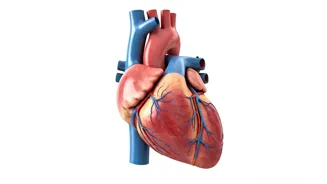Prioritize Regular Exercise
Engaging in regular physical activity is a cornerstone of heart health, as it helps in strengthening the cardiovascular system. The doctor suggests incorporating
exercise into your daily routine. It doesn't necessarily require intense workouts; even moderate activities like brisk walking, jogging, swimming, or cycling can make a difference. Aim for at least 30 minutes of moderate-intensity exercise most days of the week. Regular exercise aids in weight management, reduces blood pressure, lowers cholesterol levels, and improves overall cardiovascular function. By making exercise a consistent habit, you're actively reducing the risk of heart disease and fostering a healthier lifestyle.
Adopt a Heart-Healthy Diet
A heart-healthy diet is crucial for preventing heart disease. The doctor recommends focusing on a diet rich in fruits, vegetables, whole grains, lean proteins, and healthy fats. This dietary approach helps in controlling cholesterol levels, managing blood pressure, and maintaining a healthy weight. Minimize the intake of saturated and trans fats, sodium, and added sugars, as these can negatively impact heart health. Incorporating foods like avocados, nuts, olive oil, and fatty fish (rich in omega-3 fatty acids) can be beneficial. Making conscious food choices and maintaining portion control are vital components of a heart-healthy diet. By nourishing your body with the right nutrients, you support your heart's health and overall well-being.
Manage Stress Effectively
Chronic stress can significantly elevate the risk of heart disease, making stress management a critical aspect of maintaining heart health. The doctor stresses the importance of finding effective ways to manage and alleviate stress. Techniques like meditation, yoga, deep breathing exercises, and spending time in nature can help calm the mind and body. Building a support system of friends and family to share your feelings with can also be beneficial. Avoiding excessive alcohol and caffeine intake can further reduce stress levels. By actively incorporating stress-reducing activities into your daily life, you help lower blood pressure, reduce inflammation, and protect your heart from the adverse effects of stress.
Maintain a Healthy Weight
Maintaining a healthy weight is essential for heart health. Excess weight, especially around the abdomen, can increase the risk of various heart-related issues. The doctor recommends focusing on a balanced diet and regular exercise to achieve and maintain a healthy weight. Being overweight or obese strains the heart, increasing blood pressure and cholesterol levels, and increasing the risk of type 2 diabetes, a significant risk factor for heart disease. Regularly monitoring your weight and making adjustments to your diet and exercise routine as needed is crucial. By keeping your weight within a healthy range, you can ease the burden on your heart and lower your risk of heart disease.
Quit Smoking and Limit Alcohol
Smoking and excessive alcohol consumption significantly harm heart health. The doctor advises quitting smoking and limiting alcohol intake to protect your heart. Smoking damages blood vessels, raises blood pressure, and increases the risk of blood clots, all of which can lead to heart disease and heart attacks. If you smoke, quitting is one of the most impactful steps you can take for your heart health. Excessive alcohol consumption can raise blood pressure, contribute to weight gain, and damage the heart muscle. Moderate alcohol intake, if any, is advised. By eliminating smoking and moderating alcohol consumption, you dramatically reduce your risk of heart disease and improve your overall cardiovascular health.















